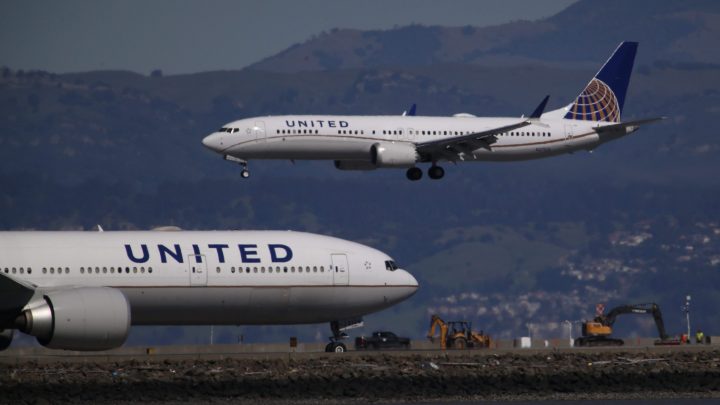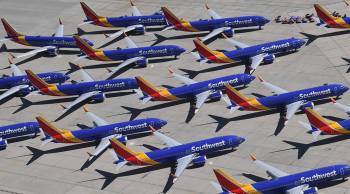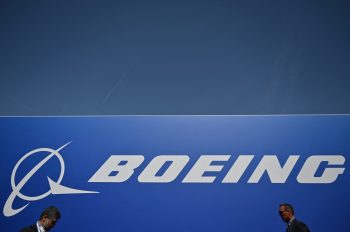
“We have to save this company from itself.” The International Association of Machinists District 751, which represents 32,000 Boeing workers that assemble planes in Washington state, demanded a seat on the company’s 13-member board of directors this week. The union, currently in contract negotiations, wants a say in Boeing’s policies and safety standards.
“With what’s going on these days, we are oftentimes the last line of defense, and we have to save this company from itself,” Jon Holden, District 751 president, told The Financial Times.
Boeing’s been dealing with a lot of turbulence as it faces scrutiny of its ability to meet safety and quality standards. The bumpy path began in January, when a door plug on one of its 737 Max 9 jets blew off in midflight, leaving a hole in the aircraft. Some airlines, which are Boeing’s customers, are looking for alternatives, frustrated by delivery delays for new planes. And its CEO said this week that he plans to leave the company by the end of 2024. (Our friends at NPR have a useful recap of Boeing’s tough year so far.)
Workers in the U.S. rarely get to sit on boards or participate in electing leadership, but many European workers do. Germany, Austria, Denmark, Finland, Norway and Sweden all provide workers with the right to “codetermine” leadership by electing some of the people who serve on their companies’ boards.
Thomas Kochan, a management professor at the Massachusetts Institute of Technology, argues that companiesshould add employee-chosen representatives to their leadership because they broaden a board’s agenda to include workforce sentiment. They should also do it simply because more workers say they want a seat.
“Workers want a voice in the key decisions that shape a company,” Kochan said in an interview with Charter Briefing. “Not in an adversarial way, but in a way that their voice is heard and that they can help hold the company accountable for adhering to its values.”
There are costs and benefits to shared governance. MIT researchers found that in Germany, which mandates codetermination in labor practices, it didn’t impact worker or executive compensation or profits. But the researchers cautioned that adding workers’ representatives to boards could decrease managerial accountability and that “workers who are overly demanding or lean too far into self-interest for themselves or fellow employees could be outvoted by other board members.”
Smart in a shot

Who should pay the costs of climate change? More local and state governments are pointing the finger at Big Oil.
Bucks County, Pennsylvania, sued several fossil fuel companies this week, alleging they “misled consumers and the public about climate change.” Residents have suffered as a result, the suit alleges, and the region will continue to endure more severe weather events.
“The taxpayers should not have to foot the bill for these companies and their greed,” Bucks County Commissioner Gene DiGirolamo said in a statement. Oil companies have dismissed the lawsuit as “meritless” and for going beyond the limits of state law.
State and local governments have filed 34 suits against the fossil fuel industry since 2017, according to a U.S. climate litigation database created by the Sabin Center for Climate Change Law at Columbia Law School. Most allege energy companies intentionally marketed their products as safe, even when they knew fossil fuels could cause climate disasters. Honolulu’s climate liability lawsuit, originally filed in 2020, will be the first to go to trial later this year.
The costs of climate change are already very high. In the U.S. in 2023 alone, there were 28 weather and climate disasters with damages exceeding $1 billion, at least $92.9 billion in total.
The numbers
We’re only 10 days away from the total solar eclipse on April 8, which will pass over 15 states from Texas to Maine. Let’s do the numbers.
80%
Light pollution is paving the way for more astrotourism. About 80% of people in the U.S. can no longer see the Milky Way from their homes. Most people who want to witness phenomena like meteor showers will have to travel to do so. (Check what light pollution looks like near you on this map.)
3.7 million
Between 931,000 and 3.7 million people are expected to travel to see the total eclipse on April 8.
50,000
The Federal Aviation Administration warned that eclipse tourists will contribute to higher flight volumes. There will be as many as 50,000 flights on some days, including to destinations along the path of totality. People in those cities can expect delays at the airport and on the road.
ISO 12312-2
That’s the international standard used in solar glasses and filters for cameras, binoculars and telescopes to safely view the eclipse.
$4.99
You can find a pack of “solar glasses” on Amazon for as little as $5, but buyer beware.
Since March 11, the American Astronomical Society has found counterfeit and fake glasses polluting the market, some of which are indistinguishable from the real thing. That’s why the AAS advises against purchasing eclipse glasses on Amazon, eBay, Temu or any other website that promotes vendors based on who offers the lowest price. It has a list of suppliers of solar viewers and filters that consumers can be confident are safe when used properly.
Want to travel for the eclipse? Here’s an interactive map of planned events along the path of totality, including light pollution and cloud cover forecasts.
None of us is as smart as all of us
Tell us what’s making you smarter at smarter@marketplace.org. We’d love to include your recommendation in a future newsletter.
Jumpstarting the “empathy economy”
Here’s an Eater story that made editor Tony Wagner smile. It’s about a food delivery worker also named Tony, who, fed up with the soulnessness of gig work in Seattle, decided to offer his delivery services sans app.
Open-source AI
Producer Rosie Hughes is reading a Wired article about DBRX, an open-source large language model that aims to provide more transparency around the building and training of artificial intelligence models than closely held models from Google and Microsoft.
Low-flow is the new high pressure
Writer Ellen Rolfes is reading a Washington Post article about how low-flow showerheads can dramatically reduce water use while providing high-quality shower experience. The best part: This bathroom upgrade only costs $20 (gift link).
There’s a lot happening in the world. Through it all, Marketplace is here for you.
You rely on Marketplace to break down the world’s events and tell you how it affects you in a fact-based, approachable way. We rely on your financial support to keep making that possible.
Your donation today powers the independent journalism that you rely on. For just $5/month, you can help sustain Marketplace so we can keep reporting on the things that matter to you.

















